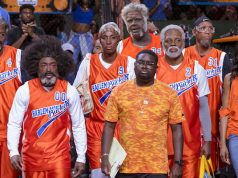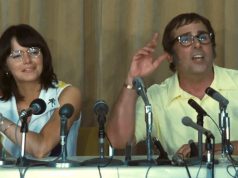Audience response has little to do with a film’s quality, much less my opinion of it — certainly I’ve disagreed with the people sitting around me many times — but I think the reaction of the crowd with whom I saw “Glory Road” is instructive.
The man in front of me, a sharply dressed African-American gentleman, chatted amiably with his girlfriend and others before the film started. He said he doesn’t go to movies very often because they’re all the same, and I thought: Uh-oh. He’s not going to like “Glory Road,” then. Surely this film is just like the other based-on-a-true-story sports movies where an underdog team comes out of nowhere to upset its favored opponents.
Then the movie began. It’s set in 1965-66, when it was unheard of for a college basketball team to be composed primarily of black players. Today, of course, it’s honestly funny to hear people say, “A team full of Negroes?! How are they going to win basketball games!,” and lines like that earned big laughs from the mostly African-American audience.
The new coach at El Paso’s Texas Western College is Don Haskins (Josh Lucas), and he’s determined to produce a winning team. To that end, he heads north and recruits black players from Detroit, Indiana and New York, offering them scholarships if they’ll leave street ball behind and come play for him.
The boosters are stunned to learn that when Haskins is finished, only five of his 12 players are white. Ross Moore (Red West), an old-timer who serves as the coach’s assistant, says college teams never use a lot of black players. “One on the road, two at home, three if you’re losing,” he says. But to start the game with four on the court? Or even FIVE?! Madness!
To these remarks, and to the much more blatant and appalling racism that followed, the audience reacted negatively and vocally, as African-American audiences are wont to do. When the team did well, the audience applauded them. Yes, it’s silly to applaud filmed images of actors pretending to re-create a game that was played 40 years ago, but no matter. The audience was INTO this movie. It was telling a story that mattered to them, the story of the first team in history to play an NCAA championship game with an all-black starting lineup. And it happened in 1966, in the era of Martin Luther King Jr., Malcolm X and Rosa Parks. This is a “black” movie as much as it is a sports movie.
But is it a GOOD movie? See, that’s the thing. I don’t think it is. It’s predictable at every turn, and it can’t seem to go five minutes without someone making an impassioned speech about one thing or another. When someone wants to quit the team, Coach Haskins says, “If you quit now, you quit every day for the rest of your life!” I thought about how I’d heard that line, or something like it, in 95 percent of all the sports movies I’d ever seen, but the man in front of me, the one who doesn’t like movies because they’re all the same, nodded and said, “Mm-hmm, that’s right.”
The title must have been chosen randomly; the words “glory” and “road” are never spoken, separately or together, in Chris Cleveland and Gregory Allen Howard’s screenplay. Only a few of the 12 players are given enough personality traits to tell them apart. Haskins’ wife might as well be played by a stagehand holding up a drawing of a woman’s head attached to a stick, for all the screen time she gets. (Her two main scenes, of course, are the one where she worries about her husband getting involved in the town’s racism, and the one at the end where she tells him how much she loves him.) Aside from some sharp editing and suspenseful storytelling in the climactic game scene, first-time director James Gartner’s work is as average as the script.
But it’s hard to discount that audience reaction, which culminated in wild applause at the end. (Contrary to what you might think, that doesn’t happen at every advance screening.) Even the guy in front of me who thinks all movies are the same loved it — and if any movie was ever the same as every other movie, it was this one.
So this is my recommendation: If you have some vested interest in the story — black history, the Civil Rights movement, or college basketball in general — or if you have not already seen “Remember the Titans” or “Miracle” or “The Rookie” or “Hoosiers” or “Coach Carter” or “Rudy” or “The Bad News Bears” or “The Mighty Ducks,” then perhaps you will love “Glory Road.” Otherwise, I don’t think you will be impressed.
C+ (1 hr., 46 min.; )





